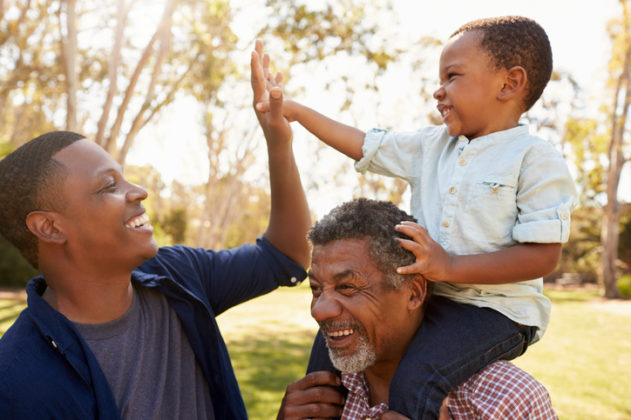Black men are often mischaracterized as threats, absent parents, or violence-prone. Older adults can be stereotyped as technophobic, rigid, low energy, and past their sell-by dates. Yet the truth in most cases is the opposite.
At first glance, your answer to that question might be “not much.” However, the unfortunate fact is that both groups are unfairly cast into pervasive, negative stories. These might be called “deficit” narratives, which play up the worst characteristics of a few, while ignoring the positive characteristics of the many.
The descriptions are largely untrue but at the same time so widespread that they pose serious obstacles to the positive change these groups are making in this country. The distorted pictures hurt our entire society. And speaking as leaders of organizations, and as a 64-year-old white woman and a 50-year-old black man, respectively, we know something about the challenges and the truth.
Black men are often mischaracterized as threats, absent parents, or violence-prone. Older adults can be stereotyped as technophobic, rigid, low energy, and past their sell-by dates.
Yet the truth in most cases is the opposite.
Black men rank among the most entrepreneurial and generous people in America according to the U.S. Department of Commerce and the W.K. Kellogg Foundation, respectively. Black men are No. 1 in rates of patriotism through military service and are the most engaged fathers in America.
Just look at Dennis Talbert of Detroit, a successful media executive who later turned his attention to creating opportunities for children in Detroit’s Brightmoor neighborhood, a hard-striving community long-starved of resources for education, safety, and prosperity. Dennis moved to Brightmoor, became head of its community center and has brought its children hundreds of opportunities to grow and develop, sometimes offering resources rivaling those of the best private schools in the country.
Yet for every Dennis Talbert, there are countless black men who don’t attain such leadership roles because too many nonprofit funders and boards prefer narratives with black people as the downtrodden and white people as leaders and saviors. Sadly, this can occur even when the black executive has qualifications equal to or better than his white counterpart.
Likewise, adults past their mid-50s defy the narrative in which they are cast. In fact, some 4.5 million people age 55 and over are already working in “encore careers” to improve their communities. Ysabel Duron, 70, for instance, launched Latinas Contra Cancer, which works to raise awareness and increase the quality of cancer care for Latinos across the country. An award-winning Bay Area journalist and anchorwoman, Ysabel came to this work through her own battle with cancer, where she found few other Latinos received treatment.
Tellingly, 21 million older adults want to pursue encore careers like Ysabel did, but have not yet found a way to do so. Misconceptions about their ability and drive—fed by the negative narratives—are a large part of the reason they have not all succeeded. Sadly, some of the very nonprofits that could greatly benefit from this windfall of older talent inexplicably hold onto these ageist assumptions, to judge by their staff rosters.
To be sure, these flawed narratives are quite different, on the one hand racist and on the other ageist. But they, as well as all the other stereotypes that are easily held and false, are damaging in two surprisingly similar ways.
First, any dominant public narrative drowns out stories and evidence to the contrary. So, our tendency to focus on the deficits of these groups literally blinds us to their overwhelming and demonstrated assets.
Second, and perhaps causing greatest harm, is what these stereotypes do to the individuals in these groups. The tendency to “live into a narrative” works in both positive and negative ways. If you tell children they are useless, unwanted, and have no place in society, you can expect them to parrot that hurtful notion throughout their lives.
The same is true for adults. Some of the worst ageism offenders can be older people who resent their more energetic peers. Similarly, there are plenty of black people who repeat and believe the message that “there are no positive black male role models” disavowing the ones they see in their own lives and neighborhoods every day.
Our organizations, BMe Community and Encore.org, work to illuminate the amazing work done by these groups. We lift their stories, connect them with peers, support their good work and catalyze others to join in.
Let’s all turn a fresh page, upgrade to better narratives about each other and embrace these groups as part of the solution to build a better future. The best way forward for America, in these trying times, is to value all members of our human family.
Ann MacDougall is President of Encore.org; Trabian Shorters is a New York Times bestselling author and founding CEO of the award-winning BMe Community. Both are Ford Foundation Public Voices Fellow of The OpEd Project.
Other Links:

